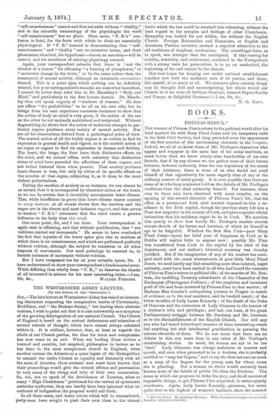THE WESTMINSTER ABBEY LECTURE.
[TO THE ]tDITOR OF THE "SPECTATOR-]
Snt,—The late lecture at Westminster Abbey has raised an interest- ing discussion respecting the comparative merits of Christianity, Buddhism, and " the Brahmo-Samaj;" but leaving these abstruse matters, I wish to point out that it is also noteworthy as a symptom -of the growing disintegration of our national Church. The Church -of England is based on the mutual forbearance and toleration of several schools of thought, which have almost always subsisted within it. It is evident, however, that, at least as regards the chiefs of our Church parties, the time for truce and compromise has now come to an end. When our leading Dean invites a learned and amiable, but sceptical, philosopher to lecture as he has done in the most conspicuous church in England, when another crosses the Atlantic as a quasi legate of the Metropolitan to commit the entire Church to equality and fraternity with all the sects of America, those eminent men must have known that their proceedings would give the utmost offence and provocation to very many of the clergy and laity of their own communion. So, too, not to speak of the Archdeacon of Taunton, when so many "High Churchmen" petitioned for the revival of systematic auricular -confession, they can hardly have been ignorant what an outburst of indignation the proposal would call forth.
In all these cases, and many others which will be remembered, party-men have sought to push their own ideas to the utmost limits which the law could be strained into tolerating, without the least regard to the scruples and feelings of other Churchmen. Sympathy was looked for not within, but without the English Church. Foreign Rationalists and Romanists, or English and American Puritan sectaries, exerted a superior attraction to the old traditions of Anglican moderation. The centrifugal force, so to speak, was stronger than the centripetal. If this craving for novelty, notoriety, and excitement, combined in the Evangelicals with a strong taste for persecution, is to go on unchecked, the beginning of the end cannot be far distant.
Our best hopes for keeping our useful national establishment together rest with the moderate men of all parties, and those, like myself, of no party at all. We common-place country clergy may be thought dull and unenterprising, but where would our Church be if we were all brilliant Stanleys, learned Payne-Smiths and Puseys, or delightful Denisons?—I am, Sir, &c., N. G. Barr.










































 Previous page
Previous page